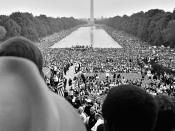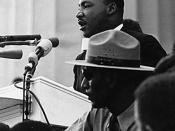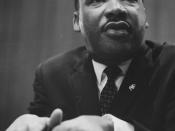MYP Year 11 Assessment 4 - Civil Rights in the USA
Section 1
According to Sources One, Two and Three what impact did the Jim Crow laws have upon the legal and social lives of African Americans living in the Southern States?
The Jim Crow Laws enacted in the USA's Southern States between 1877-1965� legalized segregation amongst African Americans and Whites in public areas under a "separate but equal" doctrine. African Americans living in these states were denied their civil rights dictated to them in the Constitution. Source two illustrates the distinct racism these laws upheld. In the source there is a photograph of two water fountains in 1958 Mississippi, there are signs above these water fountains - "White" and "Colored". The contrast between the quality of the two fountains is notable, the "White" fountain is constructed quite well, while the "Colored" fountain displays a more rustic look. The difference between the two fountains blatantly shows that African Americans were considered second-class citizens.
As well as this, Source two also has a photograph of a vending machine with the words "White customers only!" imprinted twice. In this case the extent of segregation is far worse, outright excluding African American customers. This falls neither under the "separate" or "equal" ethos of the Jim Crow Laws.
To prevent the mixing of races, under the Jim Crow Laws "The marriage of a person of Caucasian blood with a Negro, Mongolian, Malay or Hindu shall be null and void"�. Additionally to being unconstitutional, the prevention of interracial marriages, even by choice displays a strong desire to keep colored and non colored races separate.
Source one is an excerpt of the recollections of Clifford Boxley, a resident of Natchez, Mississippi. The life he describes is much akin to a slave rather than an American citizen.


